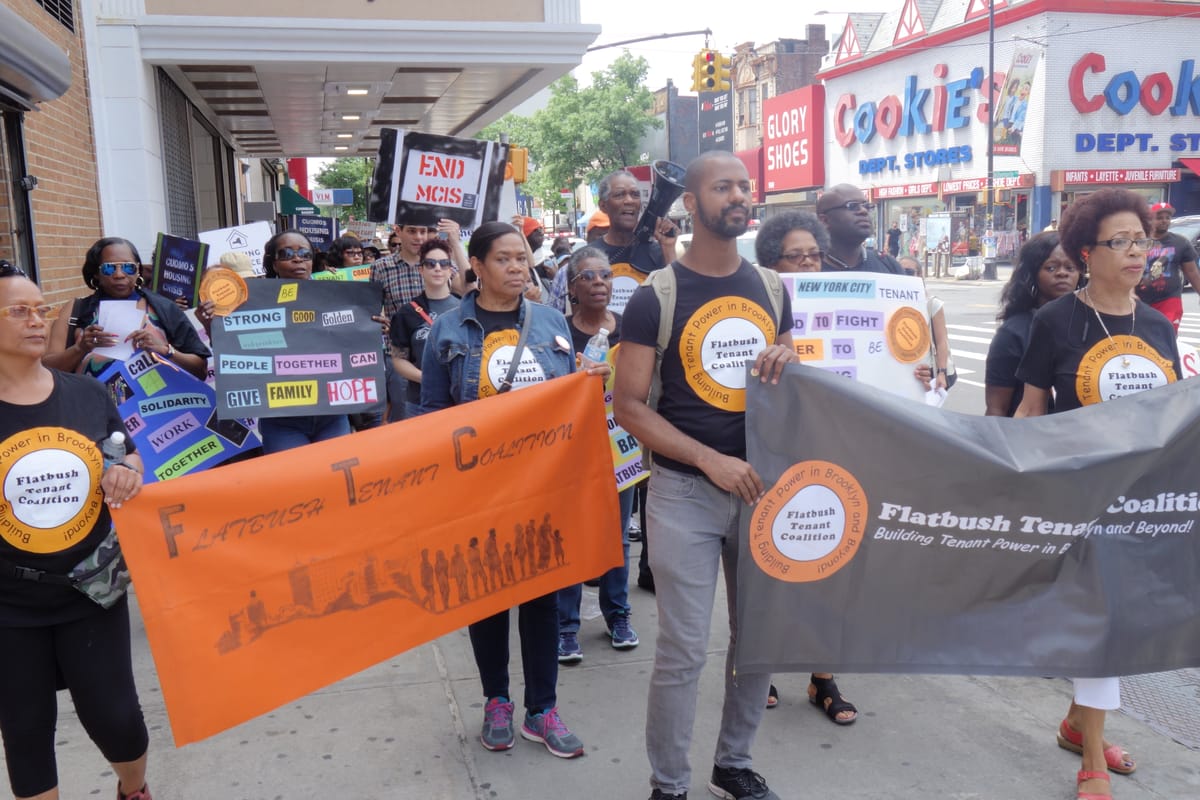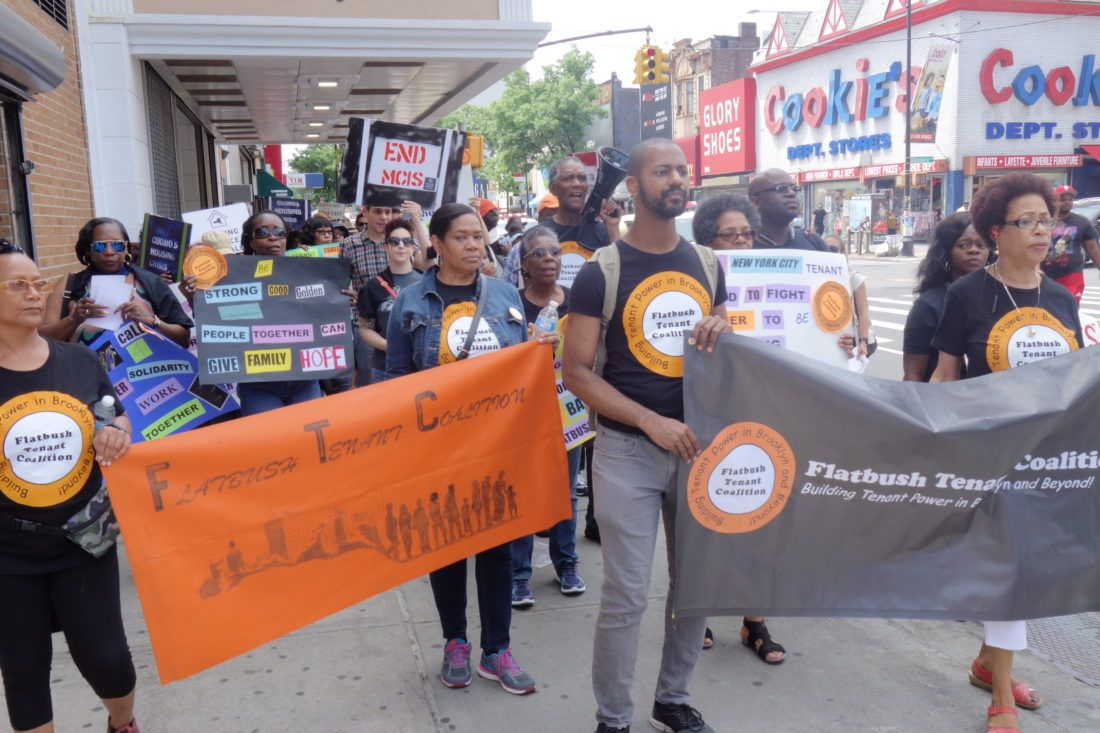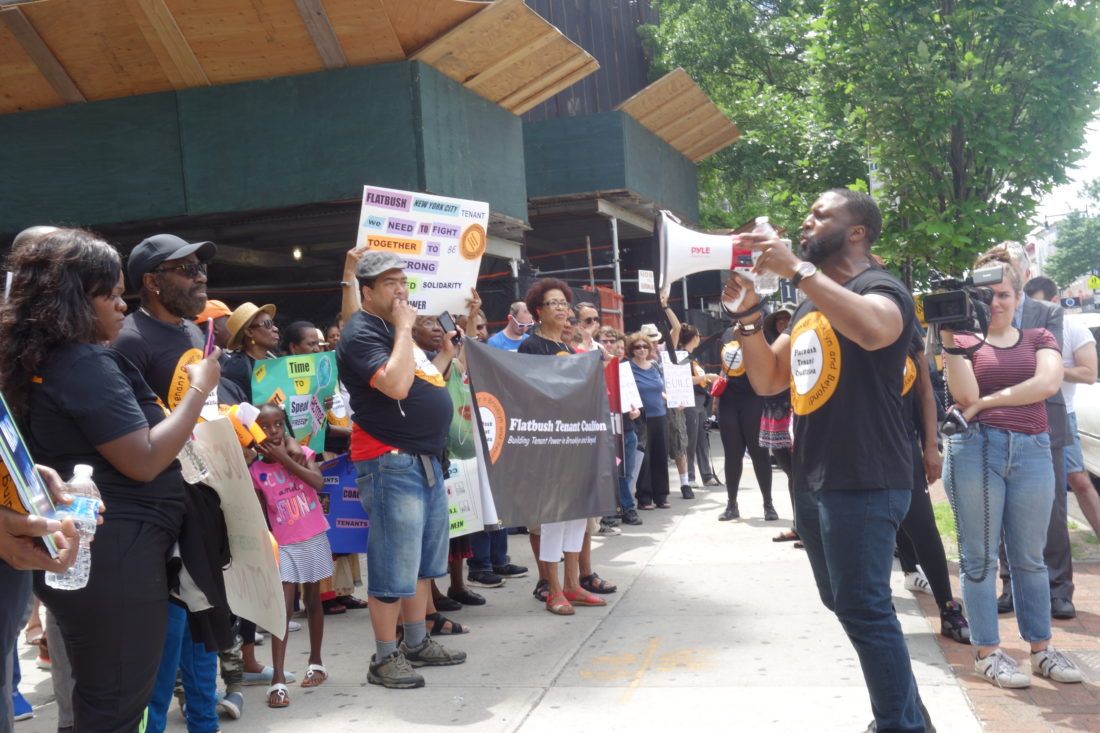Brooklyn Residents Rally in Flatbush Ahead of Rent Law Deadline


FLATBUSH—A crowd of advocates filled the streets of Flatbush Sunday to spread the word about the ongoing rent-law battle, seven days before the laws applying to the city’s rent-regulated apartments expire.
As legislators and Gov. Andrew Cuomo hash out what bills governing 1 million rent-regulated rental apartments will and won’t get passed before the session ends in a week, the Flatbush Tenant Coalition rallied to call for passing all nine bills, handing out fliers with local politicians contact information, hoisting signs and chanting into megaphones while walking around the neighborhood. Flatbush, along with other neighborhoods in central Brooklyn, has in recent years been home to high levels of gentrification and displacement and faces more of it in years to come—a common reason why rent laws were important to those who participated in Sunday’s demonstration .
“We want to remind our local politicians that you work for us,” Sundai Bestman, an organizer with Flatbush Tenant Coalition who was in Albany during recent demonstrations, shouted into the megaphone as the ralliers cheered. “We do not want a seat at the table, we want to destroy the whole goddamn table, set up a new table and have them take a seat at our table.”
“We’re out here today because the current rent laws are inequitable,” Bestman told Bklyner. “It’s going to be an uphill battle, it’s a fight. Unfortunately, some of the local politicians are in the back pocket of some of these landlords, but I think we’re going to be disruptive enough to pass all nine laws.”
Those nine laws are a rent-law package tenant advocates have dubbed universal rent control—tenant-friendly measures that would eliminate ways landlords raise rents in exchange for apartment and building upgrades, bar landlords from raising the rents when a unit becomes vacant as well as extend tenant protections to many unregulated tenants across the state, among other changes.
In Albany last week, State Assembly and Senate leaders claimed they had the votes to pass all nine bills, and in turn Cuomo said he’d sign them if the bodies did. But the leaders of the Assembly and Senate— Andrea Stewart-Cousins and Carl Heastie, respectively— soon conceded they would negotiate with the governor on the rent laws before the session ends.
Jerissa Cribb, an organizer with the Flatbush Tenant Coalition, listed getting rid of major capital improvements (MCI) —a permanent increase in rent amounting to a fraction of the money spent on the upgrades—as the most important part of the tenant-related legislation being considered.
“Why should we have to pay for [building repairs] if we don’t actually own our homes?” she said.
Mary Lutz, a retiree who lives in Flatbush, said she got involved in tenant advocacy because of gentrification. “It’s metastasized from Park Slope,” she said.
“The demonstration of tenant power is the most important thing at this point, because [politicians] know that every one of us is a voter,” she went on. “Only when people start getting out on the streets like this and organize will positive change occur.”
Andrew Butler, an actor and musical theater composer who lives in Flatbush, while walking with the demonstration told Bklyner “it’s important that we get loud to convince our lawmakers” that they have to pass the rent-law bundle or risk facing “repercussions.”

“This community is ours and we’re not going to let them use it for profit,” Estefania Trujillo Preciado, an organizer with the tenant group told the crowd.
“It’s time for us to get justice and not to be pushed out of our homes for profit,” said Sabrina Francois, another organizer with the tenant coalition.
For Francois, who was raised in Flatbush and lives in Canarsie, tenant protections and rent laws are personal. Her family, she said, had moved away due to the rising rents.
“If my family had known we had laws to protect us, or if we felt like we did, my family wouldn’t be in Massachusetts,” she explained. “It was easier for us to get up and leave, and of course that’s what they want, so I came back to fight and let people know that we don’t have to leave and we do have rights.”



